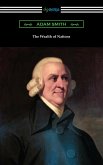In 'The Wealth of Nations,' Adam Smith lays the foundation for modern economics, presenting a comprehensive analysis of free markets, division of labor, and the invisible hand that guides economic transactions. Written in 1776 amidst the burgeoning Industrial Revolution, Smith employs a didactic style, blending empirical observation with philosophical inquiry, to elaborate on how self-interest and competition can enhance societal wealth. This seminal work critiques mercantilism and advocates for laissez-faire economics, emphasizing the importance of individual enterprise in fostering economic growth and prosperity. Adam Smith, a Scottish philosopher and economist, was deeply influenced by the intellectual climate of the Enlightenment, which championed reason and individualism. His experiences as a moral philosopher and his scholarly interest in ethics and human behavior shaped his perspectives on economic systems. Furthermore, his observations of mercantilist policies during his time fueled his conviction that a free market would lead to greater societal benefits, prompting him to pen one of the most important texts in economic theory. Recommended for scholars, economists, and curious readers alike, 'The Wealth of Nations' remains a pivotal text that invites critical thinking and discussion. Its insights not only influence contemporary economic thought but continue to resonate in debates regarding capitalism and market structures. Smith's masterful articulation of economic principles renders this work essential for anyone interested in the mechanics of wealth and society.
Dieser Download kann aus rechtlichen Gründen nur mit Rechnungsadresse in A, B, BG, CY, CZ, D, DK, EW, E, FIN, F, GR, HR, H, IRL, I, LT, L, LR, M, NL, PL, P, R, S, SLO, SK ausgeliefert werden.









